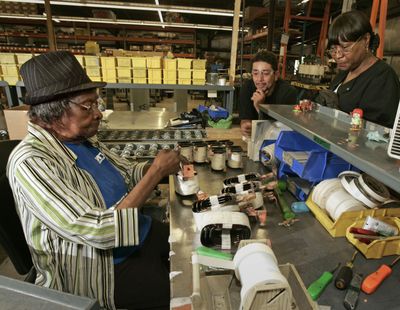Older workers staying on the job longer
Necessity, desire drive people to keep working

MENOMONEE FALLS, Wis. – Ruby S. Johnson’s co-workers presented her with a chair for her birthday this month. It’s cushioned. It swivels. And it should help make her comfortable for the rest of her working days – which could be a long time yet.
“My grandmother was 114 when she died,” Johnson says. At 93, Johnson is an extreme example of a maturing trend: working older.
She’s not delaying retirement. She’s forgoing it.
“I always want to work,” Johnson says as she deftly tears off lengths of heat-resistant tape to insulate coils of copper wire that will be used in power equipment. For 57 years Johnson has worked full time at MTE Corp., in Menomonee Falls. She says it’s not only a living but a place to go every morning, with people to see.
“I just like to keep going,” Johnson says. “I don’t want to stop.”
Because they can, because they want to – and, increasingly, because they need to – Americans are reversing a decades-long trend of retiring earlier. Consider these statistics from the Bureau of Labor Statistics:
•Data released this month show consistent year-to-year employment increases for Americans 65 and older while employment for those under 65 has dropped in each of the last three months.
•15.5 percent of Americans 65 and older were in the labor force last year, the highest rate since 1971 and part of an upward trend from a low of 10.4 percent in 1985.
•56.3 percent of workers 65 and older were working full time last year, a new high. Until 2002, part-timers always outnumbered full-timers among older workers.
•In the last 30 years, the number of American workers 65 and older grew by 101 percent, compared with a 59 percent increase in all workers. Those 75 and older increased by 172 percent.
Experts blame the rough economy for the recent surge in working past 65.
“It’s a reflection of people’s desperation more than it is a reflection of just positive things about people working longer and being happy to work longer,” said Monique Morrissey, an economist with the Economic Policy Institute, in Washington, D.C.
Lately, financial insecurity has become the leading reason for workers to put off retirement.
“That’s just going to be exacerbated by the current economy,” said Dennis Winters, chief labor market economist for the Wisconsin Department of Workforce Development.
Not only have financial markets battered retirement plans, but housing equity has eroded. Add to that the continued escalation of health costs and everything related to sky-high fuel prices, and it’s easy to understand why more people see early retirement getting out of reach.
“I’m getting a lot of phone calls by people who are trying to come up with alternatives. They’re really starting to worry,” said F. Michael Arnow, director of financial planning for Sattell, Johnson, Appel, & Co., in Menomonee Falls.
Arnow has been counseling retirees scrambling to find work to help buoy their sinking retirement plans.
“The rough part in what we’re seeing with a couple of these folks is that they had planned on doing some consulting if they needed the extra income,” Arnow said. “Now, they’re panicked and wanting the extra income, and they can’t get the consulting because everybody’s cutting back, and the consulting jobs are drying up.”
Of all the forces pushing and pulling workers to forestall retirement, the economy is a ramrod, at least for now.
“Certainly, episodic changes in the economy change short-term behaviors,” said Marcie Pitt-Catsouphes, director of the Sloan Center on Aging & Work at Boston College. “The good news/bad news story is that we are living longer, so you actually need to have more money.”
Only 20 percent of workers have defined-benefit retirement plans, down from 39 percent in 1980, according to the Bureau of Labor Statistics. That takes more employers off the hook of funding retirements but has shifted workers’ reliance to 401(k) accounts and the financial markets.
“Defined benefits and Social Security tend to let people retire when the economy is worse; 401(k)s and housing, to the extent that those values shrink when the economy is doing badly, have the opposite effect,” Morrissey said. “It’s a negative macro-economic trend. And it definitely has been worrisome.”